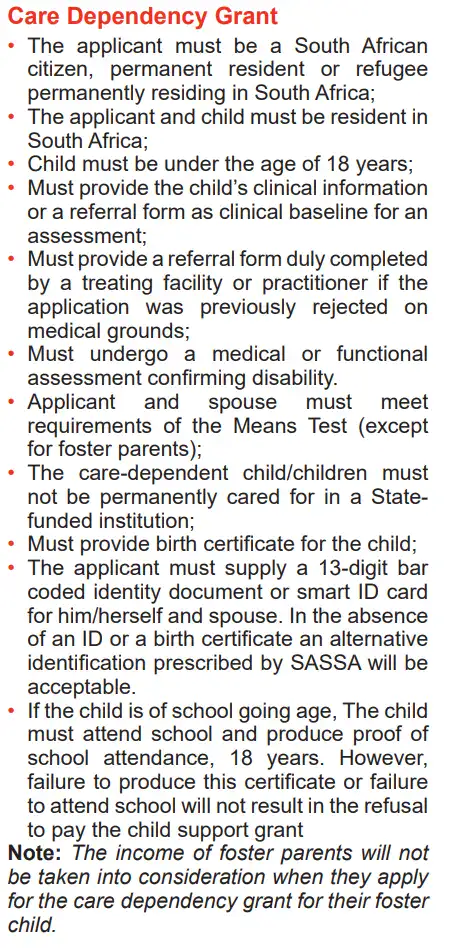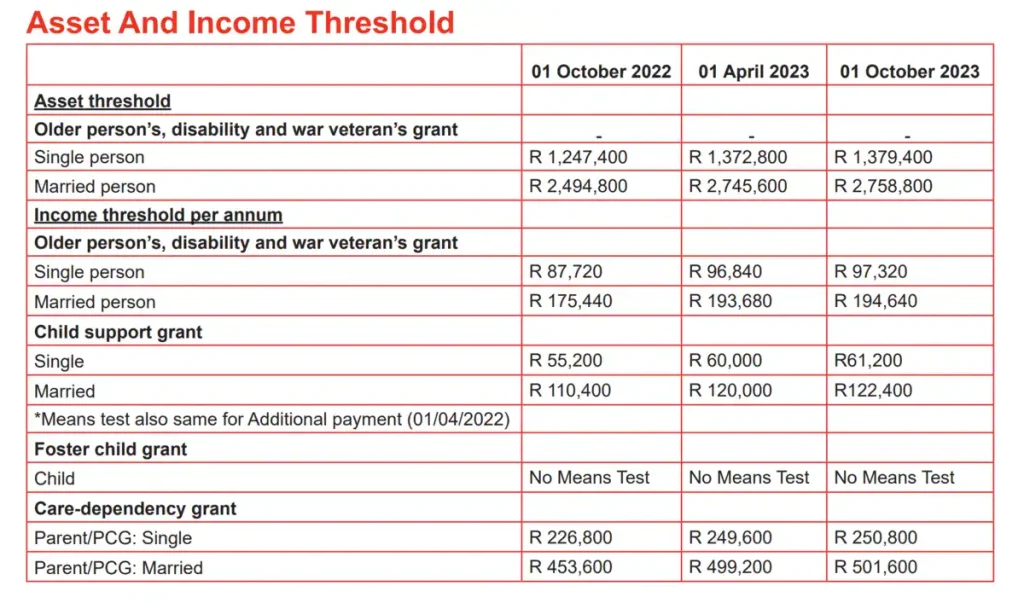SASSA Care Dependency Grant Status & Payment Dates
The SASSA Care Dependency Grant is a crucial form of financial assistance provided by the South African Social Security Agency (SASSA) to support caregivers of children with severe, permanent disabilities.
This grant helps families cover the additional costs related to medical care, therapy, special education, and daily support needs. In this complete guide, you’ll learn everything about the Care Dependency Grant, including eligibility, application steps, payment amounts, medical assessments, status checks, and common FAQs.
What is the Care Dependency Grant?
The Care Dependency Grant is a monthly social grant paid by SASSA to the primary caregiver of a child under 18 years who has a severe physical or mental disability. The disability must require permanent care or support services, meaning the child cannot function independently without continuous assistance.
This grant is designed to ease the financial burden on families who must often spend more on healthcare, transport, therapy, assistive devices, and special schooling due to the child’s condition.
SASSA Status Check
After submitting a Care Dependency Grant application, caregivers can perform a SASSA status check to track progress. The status check helps you confirm whether your application is:
- Pending
- Approved
- Rejected
- Requires additional information
You can check your Care Dependency Grant status through:
- The official SASSA website
- SASSA WhatsApp services
- Visiting your nearest SASSA office
- Calling the SASSA toll-free helpline
Keeping track of your status ensures you respond quickly if documents or medical reports are requested.
Eligibility Criteria for the Care Dependency Grant
To qualify for the Care Dependency Grant, both the caregiver and the child must meet specific requirements set by SASSA.
Primary Caregiver Requirements
The primary caregiver must:
- Be a South African citizen, permanent resident, or refugee
- Be the child’s parent, legal guardian, or primary caregiver
- Live with and care for the child full-time
- Not be paid by the state to look after the child
- Pass the means test (income assessment)
Child Requirements
The child must:
- Be under 18 years of age
- Be a South African citizen, permanent resident, or refugee
- Not be permanently cared for in a state institution
- Live in South Africa
Disability Requirements
The child must:
- Have a severe mental or physical disability
- Require permanent care or supervision
- Be assessed by a state-appointed medical practitioner
- Have a disability that significantly limits daily functioning
Income Requirements
The Care Dependency Grant is means-tested, meaning SASSA evaluates the caregiver’s income.
As a general rule:
- Single caregiver income must fall below the annual threshold set by SASSA
- Married caregivers are assessed based on the combined household income
Income thresholds are updated periodically, so it’s important to check the latest limits before applying.

How to Apply for the Care Dependency Grant?
Caregivers can apply either online or in person at a SASSA office.
Online Application
Steps for online application:
- Visit the SASSA online services portal
- Register or log in with your ID number
- Select Care Dependency Grant
- Complete the application form
- Upload required documents
- Submit and receive a reference number
Online applications are convenient and reduce waiting times.
In-Person Application
Steps for in-person application:
- Visit your nearest SASSA office
- Request a Care Dependency Grant application form
- Complete the form with the help of a SASSA official if needed
- Submit documents and medical assessment forms
- Receive a stamped receipt as proof of application
Applications are free of charge.
Care Dependency Grant Documentation Needed
When applying, you must provide:
- Your South African ID or permit
- Child’s birth certificate
- Proof of marital status (if applicable)
- Proof of income or unemployment
- Proof of residence
- Completed medical assessment report
- Bank details or preferred payment method
Missing documents can delay processing.
Care Dependency Grant Medical Assessments
A medical assessment is mandatory for approval. The assessment:
- Must be conducted by a state doctor or SASSA-appointed practitioner
- Confirms the severity and permanence of the child’s disability
- Determines whether the child qualifies for long-term care support
Temporary disabilities may be approved for a limited period and reviewed later.

Care Dependency Grant Amount
The Care Dependency Grant amount is adjusted annually by the government. Currently, the grant pays over R2,000 per month, making it one of the higher SASSA grants due to the high cost of care.
The exact amount may change each financial year based on the national budget.
How the Care Dependency Grant is Paid Out
SASSA offers multiple payment options:
- Direct bank deposit
- SASSA card
- Cash payments at approved pay points
- Selected retail outlets
Bank payments are the safest and fastest option.
Care Dependency Grant Payment Dates
Payments are made monthly, usually during the first week of each month. SASSA publishes official payment schedules in advance.
If the payment date falls on a weekend or public holiday, funds are released on the next working day.
Duration of the Care Dependency Grant
The grant is paid:
- Until the child turns 18
- As long as the child continues to meet medical and financial requirements
SASSA may conduct periodic reviews to confirm eligibility.
Reporting Care Dependency Grant Issues
You should report issues such as:
- Non-payment
- Incorrect amounts
- Change in income or address
- Change in child’s health condition
Issues can be reported at a SASSA office, via the helpline, or online.
Care Dependency Grant Fraud Consequences
Providing false information or failing to report changes may result in:
- Cancellation of the grant
- Repayment of funds
- Criminal charges
- Blacklisting from future SASSA grants
Always keep your information updated to avoid penalties.
FAQs about Care Dependency Grant
How long does it take to process an application?
Applications typically take 30 to 90 days to process. If approved, payments are backdated to the application date.
What if my application was rejected?
You can submit a SASSA appeal within 90 days of receiving the rejection notice. Appeals are reviewed by an independent tribunal.
Can temporary disability grants be extended?
Yes. Temporary grants may be extended after a new medical assessment confirms the ongoing disability.
What if the child’s health improves before 18?
If the child no longer requires permanent care, the caregiver must inform SASSA. The grant may be stopped after reassessment.
What happens when a grant recipient’s child dies?
The grant stops immediately. The caregiver must notify SASSA to prevent overpayments, which may need to be repaid.
Conclusion
The SASSA Care Dependency Grant plays a vital role in supporting families caring for children with severe disabilities. By understanding the eligibility criteria, application process, medical requirements, and payment details, caregivers can ensure they receive the financial assistance they are entitled to. Always keep your information up to date, perform regular SASSA status checks, and report changes promptly to avoid delays or penalties. This grant is more than financial support—it is a lifeline for families facing long-term caregiving challenges.